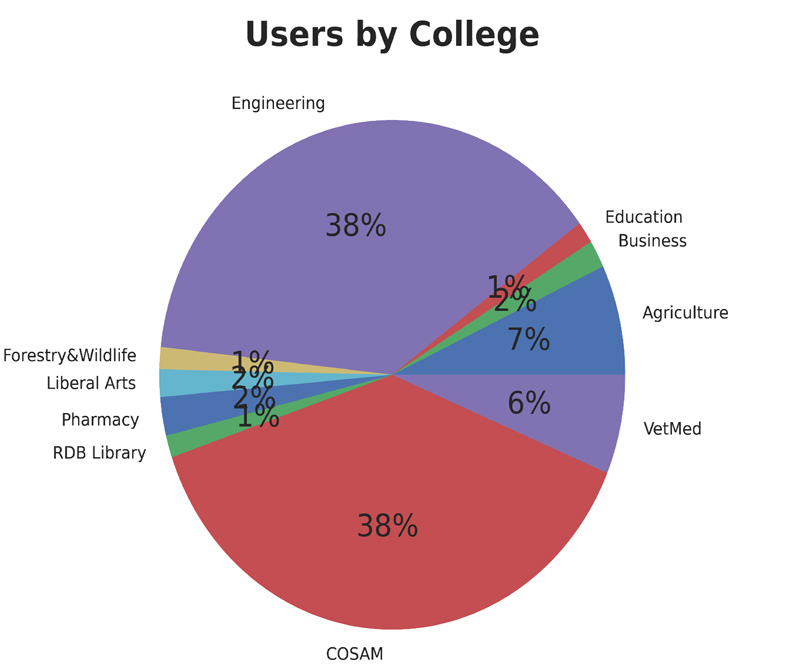With research being such an integral part of what we do here at Auburn, OIT devotes a great deal of effort to creating research resources. We work to keep networks up to speed for international collaborations as well as local efforts all across campus. We make various software packages available through virtualization and provide access to them with computer labs. And for larger-scale research, our supercomputers make quick work of complex data that would take a single computer at least 10 times longer to parse through.
For the High Performance Computing (HPC) group, 2021 entered Phase 2 of the Easley Supercomputer.
Our 2nd generation supercomputer, Hopper HPC, was decommissioned; rebuild was started.
There are ongoing research IT education sessions with the research community connecting HPC, Research data management and compliance with RBDL data management and retention plans and support.

In 2021, the Network Operations group continued making improvements to the university’s Internet connectivity by adding more redundancy and enhancing data throughput to critical cloud-based services. This included adding a redundant 100-gigabit connection to campus as a backup for our 100-gig primary connection and adding a dedicated 10-gig connection to Amazon Web Services (AWS) where critical services such as Canvas, Panopto, and Zoom are located. To ensure a high level of Internet availability, we required the redundant 100-gig backup connection to be geographically separate from our primary connection and utilize a different service provider’s network. Also, the Network Operations group completely overhauled the campus wireless network to increase overall load capacity and stability across the network. This project included upgrading ten wireless network controllers and four wireless authentication servers. Additional wireless upgrades included adding 321 wireless access points across campus to increase wireless capacity and coverage. Other accomplishments in 2021 included network upgrades in support of 13 classroom technology projects, adding 6,336 new wired network connections across campus, and completing 2,530 ServiceNow incidents and tasks.
OIT’s Network Operations, Cybersecurity, and the Infrastructure groups began working on a network strategy focused on network security segmentation that better protects critical business systems and data against ransomware and other malware and will help us determine the right investment for disaster recovery and business continuity over the next five years.
As one major project ended in 2021, a couple of new projects began. In August, the Telecommunications group completed a three-year project to migrate campus telephones to a new Voice over IP (VoIP) system. To meet the FCC’s E911 regulations for VoIP systems, a new project was started to build a network port to jack location database and deploy a new E911 address discovery solution. Also, a project to install a new cloud-based Poly telephone device management solution was started in 2021. A new speech attendant solution was deployed in 2021 to process calls received by Auburn’s main telephone number. This included designing and building a new automation process for 15,000 individual and departmental entries in the speech attendant database. The speech recognition rate on the new system reflects a 50% improvement over the speech recognition rate on the old system. Also in 2021, the telecom group began researching cloud-based contact center solutions and coordinated vendor product demonstrations for several university departments and awarded a new Prime Telecom Contractor agreement. Telecom project managers in this group supported over 60 OIT and Facilities construction projects that were either in program, design, or construction phase. The telecom group completed 2,124 service orders and resolved 703 trouble reports received in ServiceNow.
OIT and Athletics partnered to negotiate an agreement with Verizon that resulted in the installation of new 4G and 5G wireless systems in Jordan-Hare Stadium prior to the 2021 football season, thus improving fan experience with mobile voice & data services during home games.
The Digital Workspace (DWS) team refreshed over a hundred computer high-use, high-visibility kiosks and terminals in the Student Center, Parker Hall, and RBD Library with state-of-the-art zero clients accessing on-premises and cloud-virtual desktops.
The Microsoft Server Support (MSS) team has been busy expanding our Azure and Amazon Web Services (AWS) footprints, but their heads haven't been "in the clouds" all year. MSS has been working on decommissioning the Netmail system and working with archive owners on retention or retirement of old email as well as the consolidation of over 100 departmental file shares in preparation for a future migration.
The Virtualization and Storage team refreshed the on-premises hardware that supports the Banner system as well as was an active part of the Secure Storage NAS implementation team and set up an offsite encrypted disaster recovery storage repository in Nashville.
The infrastructure team continued a manual effort of documenting business services, some of their dependencies, and other metrics determined to be critically important to University function.
This infrastructure work is supplemented by the software and vendor vetting efforts that go on to make sure that our faculty, staff, and students have access to the systems they need while maintaining a secure and cost-effective environment for the University. The vetting staff oversaw more than 1000 new software requests while managing and negotiating over 100 existing software contracts for different units.
Last Updated: March 30, 2022
| Research Numbers at a Glance |
|---|
| 286 Supercomputer Researcher Accounts |
| 10,000 Cores and 50TB RAM in the Easley Supercomputer |
| 4PB Disk Space and 500T Flops processing power in the Easley Supercomputer |
| 2,124 Telephone service orders fulfilled |
| 473 New Cell Lines and upgraded mobile devices for Auburn Employees |
| 321 Wireless Access Points added |
| 6,336 New wired network connections across campus |
| 1,113 Requests received for new software purchases |
| 104 Ongoing software contracts and renewals managed while negotiating cost savings for the University |